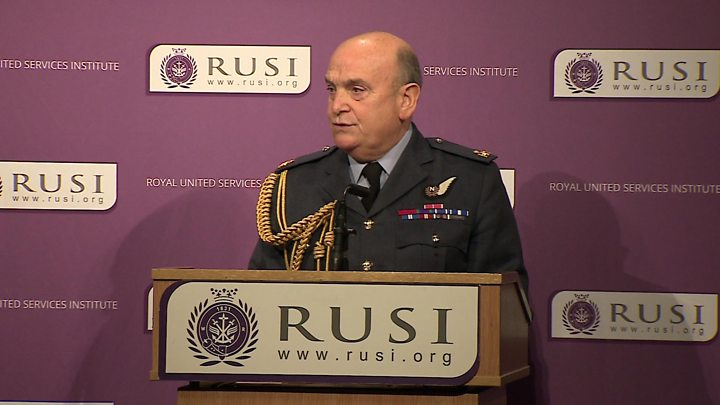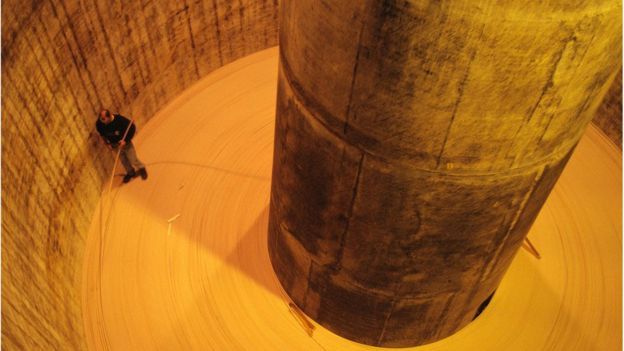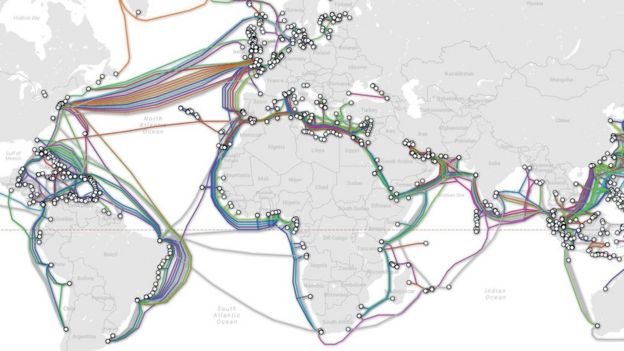Russia a 'risk' to undersea cables, defence chief warns

Sir Stuart Peach: Russia poses a "new risk" to economy and ways of living.
The UK's most senior military officer has warned of a new threat posed by Russia to communications and internet cables that run under the sea.
Air Chief Marshal Sir Stuart Peach, the chief of the defence staff, said Britain and Nato needed to prioritise protecting the lines of communication.He said it would be an "immediately and potentially catastrophic" hit to the economy if they were cut or disrupted.
The cables criss-cross the seabed, connecting up countries and continents.
- Could Russian submarines cut off the internet?
- How much of a threat does Russia pose?
- Four facts about undersea cables
"In response to the threat posed by the modernisation of the Russian navy, both nuclear and conventional submarines and ships, we along with our Atlantic allies have prioritised missions and tasks to protect the sea lines of communication," he said.
 Image copyright Science Photo Library
Image copyright Science Photo Library "Because Russia in addition to new ships and submarines continues to perfect both unconventional capabilities and information warfare."
The UK and its allies needed to "match and understand Russian fleet modernisation", he added.
"There is a new risk to our way of life, which is the vulnerability of the cables that criss-cross the seabeds," he said.
"Can you imagine a scenario where those cables are cut or disrupted, which would immediately and potentially catastrophically affect both our economy and other ways of living."
Where are the undersea cables?
 Image copyright TeleGeography
Image copyright TeleGeography But it said a lack of formal state ownership meant cables do not have strong protection in international law.
Despite that, an estimated 97% of global communications and $10 trillion in daily financial transactions are transmitted by cables under the ocean.
"Undersea cables are the indispensable infrastructure of our time, essential to our modern life and digital economy, yet they are inadequately protected and highly vulnerable to attack at sea and on land, from both hostile states and terrorists," the report concluded.
Conservative MP Rishi Sunak, author of the report, warned a successful attack on the UK's network of undersea communications cables could deal a "crippling blow" to the country's security and economy.
'Dark cables'
He said the locations of the cables were "both isolated and publicly available" and a successful attack would be an "existential threat to our security".Writing a foreword to the document, Admiral James Stavridis, a former US Navy officer and ex-Nato supreme allied commander, said: "It is not satellites in the sky, but pipes on the ocean floor that form the backbone of the world's economy."
"We have allowed this vital infrastructure to grow increasingly vulnerable and this should worry us all," he added, warning of a potential threat from China and Iran, as well as Russia.
He called for the creation of more "dark cables", to be kept in reserve, and said Nato must be prepared to defend global submarine cables, if necessary.
It comes after a ship dragging its anchor cut three undersea internet cables connecting the Channel Islands to the UK last year.
It resulted in slower internet connections and phone problems across the islands.



Ingen kommentarer:
Legg inn en kommentar
Merk: Bare medlemmer av denne bloggen kan legge inn en kommentar.